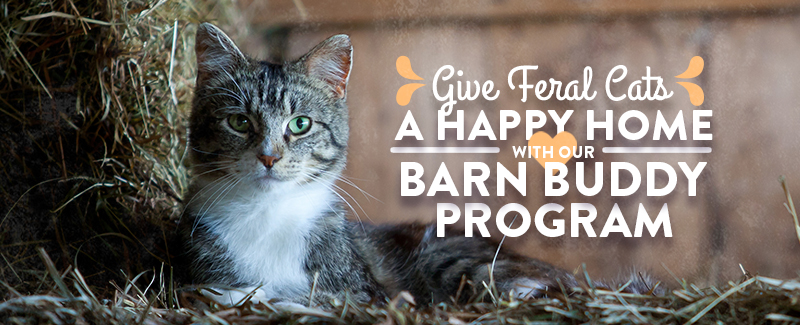Application Intake Closed
We appreciate your interest in the Barn Buddy program. At this time, we have successfully matched all cats currently in our care and will therefore be suspending application intake for winter.
We anticipate reopening the application process in the Spring. Thank you for your continued commitment to assisting the animals that come into our care.
Animal Care and Control Centre care for more than 800 feral cats every summer. These cats have had little to no socialization with humans, which means they are wild animals and not adoptable. Although it is important to get these animals off the streets and decrease the feral cat population, it does pose the question: "Now what?"
Program Details
The Barn Buddy Program places feral cats with willing and appropriate rural applicants who can provide outdoor residency and access to shelter, food and water. This program runs from April 1 to October 30 every year. All feral cats will be fixed and microchipped, at no cost to the applicant. Caregivers must also provide veterinary care, when appropriate, and provide a bi-annual update on how the cat is doing to Animal Care and Control.
Donations are accepted in lieu of an adoption fee and will help to cover costs of in-centre care and surgeries.
Frequently Asked Questions
A feral cat has been born to other feral or stray cats and has received no socialization with humans. Its behavioural characteristics reflect those of a wild animal in that it will run, hide or act aggressively if approached. Feral cats have spent their whole lives living on the streets and are able to find food, water and shelter in order to survive. Feral cats reproduce at an alarmingly fast rate, so efforts to trap and sterilize are critically important. As these cats are not domesticated, there is little hope of rehabilitation or adoption when the animal is past the kitten stage.
Feral cats are born hunters. This means they are also well-suited to a barn or acreage setting. A “barn buddy” is a feral cat that has been trapped, fixed and relocated to a new rural, outdoor residence. These cats are not domesticated and are happier and less stressed if given an opportunity to live outdoors.
Feral cats reproduce at alarming rates, so removing them from the streets and sterilizing them helps to control feral cat populations. Since these cats present as wild animals, there is no hope for adoption into a residential home. This means shelters need to look for other live-release options as an alternative to euthanasia.
Although these animals are great hunters and can fend for themselves, once they are removed from their original habitat, they can get very confused and disoriented. Relocated cats do not know the good hunting spots, dangers that may be present, or the environment they have been moved to. Providing shelter, food and water helps with their adjustment and also ensures proper nutrition if natural food sources are not enough.
The City of Edmonton will contact all Barn Buddy Program participants through email, twice per year. Participants will complete a basic questionnaire to help us gather information about the relocated cats. It is important for us to track the whereabouts and health of these animals in order to measure the success of the program. Each questionnaire should take no more than 10 minutes to complete.
Edmonton is a northern city, which means we experience all 4 seasons. When a cat is fixed, the surgical procedure includes shaving of the animal, anaesthesia and some recovery time. Industry best practices suggest that releasing a shaved cat back into our northern elements is inhumane and unhealthy for the animal. This is why we limit this program to times when the weather is warmer and more predictable.
Contact Us
311 Contact Centre
Phone 311 | Outside Edmonton and Video Relay Service (VRS): 780-442-5311 | TTY 711


